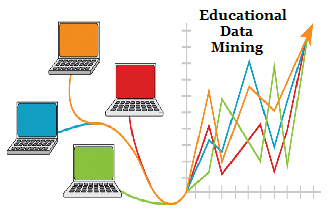Educational Data Mining (EDM) is an emerging discipline, concerned with developing methods for exploring the unique types of data that come from educational settings, and using those methods to better understand students, and the settings which
they learn in.
Educational Data Mining focuses on developing new tools and algorithms for discovering data patterns. EDM develops methods and applies techniques from statistics, machine learning, and data mining to analyze data collected during teaching and learning. EDM tests learning theories and informs educational practice.
Educational data mining is emerging as a research area with a suite of computational and psychological methods and research approaches for understanding how students learn. New computer-supported interactive learning methods and tools—intelligent tutoring systems, simulations, games—have opened up opportunities to collect and analyze student data, to discover patterns and trends in those data, and to make new discoveries and test hypotheses about how students learn. Data collected from online learning systems can be aggregated over large numbers of students and can contain many variables that data mining algorithms can explore for model building.
Goals of EDM:
1. Predicting students’ future learning behavior by creating student models that incorporate such detailed information as students’ knowledge, motivation, metacognition, and attitudes;
2. Discovering or improving domain models that characterize the content to be learned and optimal instructional sequences;
3. Studying the effects of different kinds of pedagogical support that can be provided by learning software; and
4. Advancing scientific knowledge about learning and learners through building computational models that incorporate models of the student, the domain, and the software’s pedagogy.
Digging Deep into Educational Data
Educational Data Mining: Predict the Future, Change the Future

![[infographic] Kids Are Using More Mobile Than Ever - According to Apple Infographic Kids Are Using More Mobile Than Ever - According to Apple](https://www.edtechreview.in/wp-content/uploads/Daily/EdTechTrends/kid-technology-by-apple-150x150.jpg)
